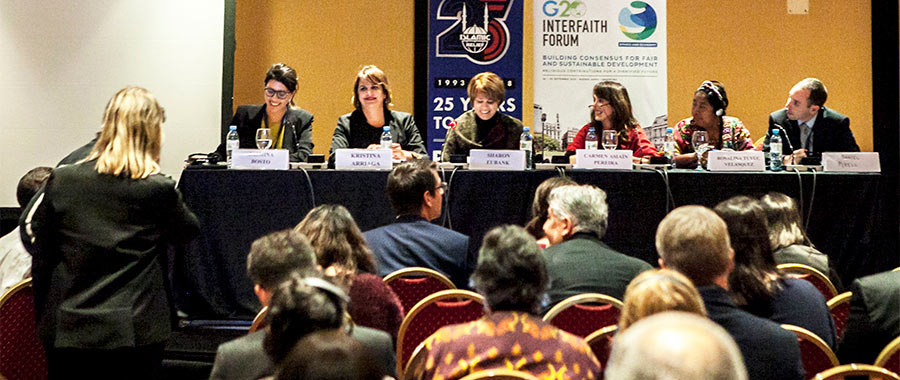The evolution of the Bahá’í perspective on interfaith dialogue is not merely an academic curiosity; it embodies a profound exploration of the nature of humanity and the harmonious coexistence of diverse religious traditions. At its core, interfaith engagement offers an essential lens to scrutinize the foundational tenets of Bahá’í beliefs, particularly as they relate to unity, peace, and the quest for truth. This discourse invites an examination of historical contexts, theological underpinnings, and the implications of inter-religious collaboration in a contemporary global society.
The Bahá’í Faith, emerging in the 19th century amidst a backdrop of religious upheaval and social transformation, centers its doctrine around the oneness of humanity and the progressive revelation of divine guidance through various religious leaders. The teachings of Bahá’u’lláh, the founder of the Bahá’í Faith, emphasize that all major world religions have brought vital truths and insights to humanity. This principle not only fosters respect for religious diversity but also underscores a compelling narrative that all faiths serve a common purpose.
At the heart of the Bahá’í perspective on interfaith dialogue is the principle of unity. Unity among diverse faiths is not perceived as mere tolerance but as an active and dynamic interaction promoting mutual understanding and collaboration. This principle challenges the insularity that often characterizes religious communities. By advocating for sustained dialogue, the Bahá’í teachings illuminate pathways to reconcile differences and embrace a broader vision of community that transcends sectarian boundaries.
Furthermore, the evolution of interfaith dialogue within Bahá’í teachings is shaped by historical and sociopolitical contexts. The 20th century, marked by catastrophic wars, genocides, and widespread disillusionment, necessitated an urgent call for collaboration among religions. In light of these global crises, the Bahá’í community has actively engaged with other faith traditions, initiating dialogues that confront the stark realities of extremism and sectarian violence. This shift towards a proactive approach in addressing shared societal challenges speaks to the underlying recognition that systemic issues are frequently bred in the absence of communication and understanding.
Moreover, the Bahá’í approach to interfaith dialogue is informed by a distinct moral imperative. The teachings posit that all individuals are endowed with an innate capacity for spiritual development, and thus, engagement in interfaith discussions is not solely an academic exercise. Rather, it is an experiential journey of discovery where people can uncover deeper spiritual truths while upholding the integrity of their respective beliefs. The Bahá’í community’s relentless commitment to fostering interfaith discussions demonstrates an understanding that genuine dialogue facilitates spiritual maturity and societal progress.
In the contemporary milieu, interfaith dialogue has become increasingly relevant. Rapid globalization, technological advancements, and demographic changes have coalesced to create a landscape replete with both challenges and opportunities. The Bahá’í vision posits that embracing religious plurality is paramount in this context. By advocating for a collective approach to addressing global challenges—be it climate change, social injustice, or economic disparity—the Bahá’í teachings recognize that no single faith or ideology has a monopoly on truth or solutions.
Additionally, the role of education in fostering interfaith dialogue cannot be understated. The Bahá’í teachings emphasize the importance of educating individuals about different worldviews. Through comprehensive educational programs, the Bahá’í community strives to cultivate an environment conducive to inquiry, understanding, and appreciation of diverse religious backgrounds. Such educational initiatives are instrumental in dismantling prejudice and fostering a spirit of inclusion, which is essential for harmonious cohabitation in an increasingly diverse world.
The dialogue between faith traditions also brings forth pivotal questions regarding the intrinsic nature of truth. The Bahá’í teachings espouse that spiritual truth is multifaceted and cannot be confined within the rigid binaries of right and wrong. This perspective invites a reevaluation of how truth is perceived across religions; rather than viewing religious assertions as competing narratives, engagement invites adherents to explore their spiritual essence collaboratively. Through this lens, the Bahá’í interpretation of interfaith dialogue is transformed into an iterative process, fostering personal and communal growth.
Nevertheless, the evolution of the Bahá’í perspective on interfaith dialogue does not celebrate uncritical acceptance of all beliefs. Rather, it champions a principled approach where individuals remain steadfast in their own beliefs while being open to the insights provided by others. This balance between conviction and openness cultivates depth in dialogue, ensuring that it is enriching rather than superficial. The art of listening becomes paramount, emphasizing a reciprocal learning process that champions empathy and shared human experience.
In conclusion, the Bahá’í perspective on interfaith dialogue serves as a compelling framework for examining the interplay between faith, society, and the shared human experience. As religious communities worldwide grapple with sectarian divides and seek pathways to harmony, the Bahá’í teachings provide valuable insights into fostering dialogue, respect, and collaboration. The evolving discourse underscores an enduring truth: that in the rich tapestry of human spirituality, every thread contributes to a deeper understanding of our collective identity and purpose.
